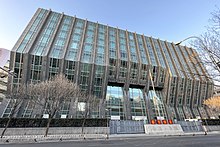All-China Federation of Industry and Commerce
The All-China Federation of Industry and Commerce (ACFIC), also called the All-China Chamber of Industry and Commerce (ACCIC) is a people's organization and chamber of commerce, established in 1953 as a successor to the chambers of commerce that were first founded during the Qing dynasty.
| 中华全国工商业联合会 | |
 ACFIC headquarters | |
| Abbreviation | ACFIC |
|---|---|
| Formation | 1953 |
| Founder | Chen Shutong |
| Type | Business association |
| Legal status | People's organization |
| Location | |
Membership | 4.71 million |
Key people | Gao Yunlong (Chairman) Xu Lejiang (Executive Vice Chairman) |
| Website | www www |
| All-China Federation of Industry and Commerce | |||||||
|---|---|---|---|---|---|---|---|
| Simplified Chinese | 中华全国工商业联合会 | ||||||
| Traditional Chinese | 中華全國工商業聯合會 | ||||||
| |||||||
| Abbreviation | |||||||
| Simplified Chinese | 全国工商联 | ||||||
| Traditional Chinese | 全國工商聯 | ||||||
| |||||||
| All-China Chamber of Industry and Commerce | |||||||
| Simplified Chinese | 中国民间商会 | ||||||
| Traditional Chinese | 中國民間商會 | ||||||
| |||||||
Today, it consists of Chinese industrialists and business people under the leadership of the United Front Work Department of the Chinese Communist Party (CCP), as well as being a constituent organization of the National Committee of the Chinese People's Political Consultative Conference (CPPCC) and the holder of a number of seats in the National People's Congress. The organization assists the government in managing China's private sector economy and acts as a bridge between the private sector entities and the government.[1][2][3]
History
editThis section needs to be updated. (June 2023) |
The ACFIC is a non-governmental chamber of commerce established in 1953.[4]: 167 The ACFIC was established to advance the Communist Party's interests and promote the party's policies among private entrepreneurs.[4]: 167
From November 2002 to 2012, the ACFIC had been led by Chairman Huang Mengfu (Chinese: 黄孟复), who, like his predecessors, was also a vice chairman of the Chinese People's Political Consultative Conference National Committee, ranking as a national leader of China. His predecessor was Jing Shuping, founder of the first private bank in modern China and the son of a well-known entrepreneur of the late Qing Dynasty.[citation needed]
The first vice-chairman of the ACFIC is Quan Zhezhu (Chinese: 全哲洙), a deputy minister of the United Front Department originally from Jilin. The ACFIC has another 23 vice-chairpersons, most of them private entrepreneurs.[5]
Organization
editThe ACFIC is led by a ministerial-level CCP secretary and chairman. The chairman has usually been a member of the China National Democratic Construction Association, also serving as a vice chairman of the Chinese People's Political Consultative Conference.[6] ACFIC leadership is chosen through consultation between the CCP and private enterprise.[7] The ACFIC is a constituent of the CPPCC and is allocated seats to the NPC.[8] ACFIC seeks to influence policy through submitting proposals to the CPPCC, a process which requires relevant government ministries to investigate the proposals and prepare a formal response.[4]: 167
More than 3,000 regional federations of industry and commerce (FIC) have been established in all provinces and prefectures and most counties of China. The relationship between ACFIC and the regional FIC is described as a role of guidance, but the statute of ACFIC is also valid for the regional federations.[9]
In September 2020, the CCP announced that it would establish more party committees in regional FICs, and would arrange a special liaison between them and the CCP.[10]
See also
editReferences
edit- ^ Weil, Stefanie (2016-12-01). Lobbying and Foreign Interests in Chinese Politics. Springer. pp. 82–118. ISBN 978-1-137-55620-2.
- ^ Dotson, John (September 28, 2020). "The CCP's New Directives for United Front Work in Private Enterprises". Jamestown Foundation. Retrieved 2020-09-30.
- ^ Yan, Xiaojun; Huang, Jie (2017). "Navigating Unknown Waters: The Chinese Communist Party's New Presence in the Private Sector". China Review. 17 (2): 37–63. ISSN 1680-2012. JSTOR 44440170.
- ^ a b c Zhang, Angela Huyue (2024). High Wire: How China Regulates Big Tech and Governs Its Economy. Oxford University Press. doi:10.1093/oso/9780197682258.001.0001. ISBN 9780197682258.
- ^ "ACFIC Leaders". Archived from the original on 2010-08-28. Retrieved 2010-08-28.
- ^ "Decoding Chinese Politics". Asia Society. Retrieved 2 October 2023.
- ^ Li, David Daokui (2024). China's World View: Demystifying China to Prevent Global Conflict. New York, NY: W. W. Norton & Company. p. 135. ISBN 978-0393292398.
- ^ Groot, Gerry (June 19, 2018). "Understanding the Role of Chambers of Commerce and Industry Associations in United Front Work". Jamestown Foundation. Archived from the original on September 11, 2019. Retrieved 2019-09-14.
- ^ "ACFIC Website (in Chinese)". Archived from the original on 2010-08-23. Retrieved 2010-08-25.
- ^ General Office of the CPC Central Committee. "Opinions on Strengthening the United Front Work of Private Economy in the New Era". Xinhua. Archived from the original on 19 October 2020. Retrieved 15 September 2020.
External links
edit- Official website (in English)